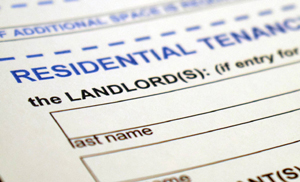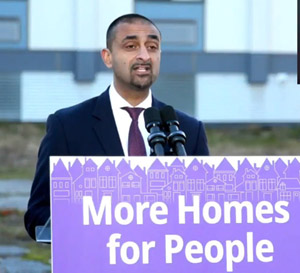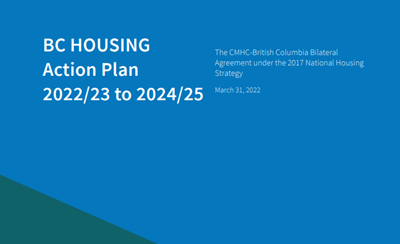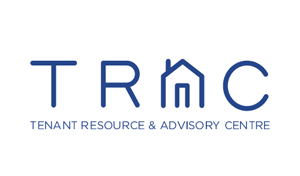Wednesday December 28, 2022 | VICTORIA, BC
by Mary P Brooke | Island Social Trends
Renters and landlords in BC will soon benefit from more timely and efficient supports and services, says BC’s new Housing Minister Ravi Kahlon.
Today in a media session Kahlon said that government is taking action to speed up and strengthen residential tenancy dispute resolution.
“Renters and landlords have been clear that the current residential tenancy dispute resolution process isn’t working fast enough to address their needs,” said Kahlon today.
“We hear you and we are taking action to speed up service and strengthen enforcement to address things like repeat or serious offences like illegal evictions, so renters and landlords can get the fair treatment and timely support they deserve.”
Kahlon was introduced today by Spencer Chandra Herbert who chaired the BC Rental Housing Taskforce in 2018.
More staff as a solution:
Government is increasing the Residential Tenancy Branch‘s (RTB) operating budget and staffing by 40%, adding as many as 50 new full-time employees to cut waiting times and doubling the size of the Compliance and Enforcement Unit (CEU). RTB has 118 full-time-equivalent employees.
Apparently the hiring opportunity to work at one of those new positions is posted within BC government websites. [BC Housing Careers page]
The CEU was launched in 2019 to investigate complaints and take action on repeat or serious residential tenancy offences, such as illegal evictions, and levy monetary penalties, if necessary.
Helping landlords more than tenants?
“Months is too long,” said Kahlon today, as to how landlords are feeling about waiting for resolutions.
In addition to hiring more staff, the RTB will continue to revitalize its dispute resolution processes to make those processes more user-focused and easier to navigate. This includes an increase in early intervention to resolve disputes without a hearing. The RTB is in the process of making enhancements to its online service portal, which has sped up the application process.
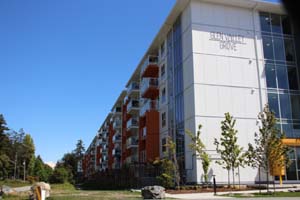
This expands the current system based on current regulations and laws, but does not necessarily change several underlying problems for tenants such as rental supply and work-arounds by landlords (such as ‘renovictions’ and using the family-needs-to-move-back-in option to force a tenant out).
Forcing tenants out with family-work-around:
“We’ve heard that concern,” said Kahlon regarding the family-move-in-tenant-force-out tactic, adding “it’s something we’re also monitoring”. Kahlon says “the RTB does have the ability to do some investigation”, saying the “new expanded team will have the ability to go in and do some of that work”.
“But I think that’s something we’re happy to explore in more detail and come back to everyone with,” said Kahlon in response to Island Social Trends today on this topic.

Sometimes this tactic is more easily accomplished when a property management company is the go-between. Island Social Trends asked Minister Kahlon if there is any specific attention paid to property management companies and how they handle things, or do these types of companies get bunched in with landlords (so far as the Ministry sees ‘landlords’).
It might also be used more-so with house rentals that apartment-suite rentals. Many new neighbourhoods in Greater Victoria’s west shore are comprised of homes that are purpose-built to be owned by investors for rental to tenants; this often supports the property management sector as well.
“We’re always getting recommendations from various organizations that are supporting tenants, and from landlords organizations as well. We’re always reviewing those recommendations, looking for more ways to be able to support tenants,” said Kahlon.
New housing strategy in 2023:
“We know this is a challenging time,” he said, itemizing that people are just pulling out of the pandemic impacts, that there are are historically low vacancy rates, and that immigration numbers are “historically high”.
“We know these pressures are there. We’re reviewing all these pieces,” said Kahlon, and revealed that “right now were are refreshing our housing strategy”.
“We’re hoping to have a new housing strategy launch early in the new year which will address issues of both speed and supply in the housing market, also supports for renters,” said Kahlon.
New directions for a housing strategy was launched about five years ago at the beginning of the BC NDP government’s initiatives to shift the provincial economy and society in a more progressive direction, starting in 2017; the focus was primarily on producing more housing supply, with a promise of 114,000 new units within 10 years.
In March 2022 a housing action plan for 2022/23 to 2045/25 was released, in part aiming to address rental housing availability and affordability through measures such as reducing the rate of allowable rental increases, ending the “fixed term tenancy loophole,” improving compliance and enforcement of residential
tenancy laws, and providing a $10 million investment to support a province-wide rent bank system.
High volume of applications:
As a result of the COVID-19 pandemic and overall demand from more people moving to BC, the RTB has received a high volume of applications, it was stated today.
“Waiting times for dispute resolution remain long. This new investment of as much as $15.6 million over three years is a significant injection of new staff and resources to improve service delivery and speed up waiting times for hearings.”
The Housing ministry claims that doubling the size and increasing the capacity of the Compliance Enforcement Unit (CEU) will improve its ability to address serious issues and ensure people are getting fair treatment. “It will also allow the CEU to intervene earlier and prevent the need for hearings in the first place, and also take on more cases, which will reduce matters that escalate into multiple requests to the RTB for arbitration.”
Accessing and enforcing rights:
“As tenants grapple with the ongoing housing and eviction crises, it is essential that they can access and enforce their rights at the RTB,” said Robert Patterson, lawyer, Tenant Resource and Advisory Centre (TRAC).
“This additional support for the RTB will mean that tenants whose landlords are ignoring the law can have their urgent concerns addressed sooner. TRAC hopes that adding more staff will mean not only that tenants’ cases will be heard more quickly, but also that arbitrators will have the time and support they need to give well-reasoned decisions. We also applaud the government’s investment in the Compliance and Enforcement Unit, which has been an incredible resource for tenants, by preventing illegal evictions and taking meaningful action against bad-faith landlords,” said Patterson in today’s government news release.
“Not only will this new investment alleviate financial concerns for landlords by allowing them to solve rental disputes faster, but it will also ensure that their unit is available to provide housing to people in BC at a time when it’s needed most,” said David Hutniak, CEO, LandlordBC.
“We are pleased to see this government take action to resolve a process they recognize isn’t working. We look forward to continuing to work alongside them to create better solutions for landlords and renters in our province,” said Hutniak in today’s news release.
Funding over three years:
Currently, RTB’s 2022-23 budget is $11.533 million.
Kahlon says this new funding of $15.6 million over three years builds on actions government has taken to better protect renters since 2017.
He itemized those improvements as including capping rent increases below inflation at 2% in 2023, banning illegal renovictions, launching Canada’s first province-wide rent bank, closing the fixed-term lease loophole, ending all strata rental-restriction bylaws and limiting age-restriction bylaws in strata housing with the exception of 55 and older.
===== Learn More:
- For information about the Residential Tenancy Branch, visit:
https://www2.gov.bc.ca/gov/content/housing-tenancy/residential-tenancies - To learn about the steps the Province is taking to tackle the housing crisis and deliver affordable homes for British Columbians, visit: https://workingforyou.gov.bc.ca/
===== ABOUT ISLAND SOCIAL TRENDS:

Island Social Trends is a professional news service that covers news of the west shore, south Vancouver Island, BC and national issues.
Island Social Trends launched entirely online at islandsocialtrends.ca in mid-2020, in the footsteps of its predecessor publications MapleLine Magazine (2008-2010), Sooke Voice News (2011-2013) and West Shore Voice News (2014-2020).
Editor and publisher: Mary P Brooke


